Teacher Edition | View the Map
Week of April 2, 2023
Right click and SAVE AS
to download the Google Earth file for this episode
Use free Google Earth software
to OPEN it, using File> Open.
Find more tech info here.
We literally just checked into our hotel in Geneva, Switzerland. Yesterday we were in Germany. I know you are all probably a bit confused because the last time we wrote, we were in Paris and London. Well, Uncle GT called us late on Tuesday night in Paris (after we returned from London). He told us Phoebe had purchased a train ticket from Paris to Geneva, Switzerland. We immediately went to the train station and caught the last train of the night heading to Germany. This was our quickest option to get to Switzerland. We had a connecting train first thing Wednesday morning (earlier today) to get us to Switzerland. So last night we spent the night in Berlin, Germany (the capital city). We arrived early enough to learn a lot about Germany.
I was absolutely starving when we arrived in Germany for the night. Luckily there was a small German market across the street from our hotel. So we checked into the hotel and immediately headed to the market to get some yummy German food. On our way to the market, something very frightening happened. We saw a motorbike driving quickly down the small lane where we were walking. Geo saw an elderly woman getting ready to cross the street. The motorbike was heading straight toward the woman. Geo ran and grabbed her, and pulled her out of the way. Her bag of groceries went all over the lane. The driver of the motorbike pulled over and apologized. He was going to pick up his daughter from ballet lessons and running late. He ensured we were all okay, jumped back on his bike, and left. The woman, Fraulein Garrett, thanked us profusely for helping her and ensuring she wasn't hit by the motorbike. She told us that she was about to go home and make dinner. She lived alone and wanted to thank us for saving her from the crash, so she invited us back to her house. The house was on the same street as our hotel and the market, so we figured it would be safe and easy. We still called Uncle GT to ensure he agreed we could go to her house. He said it was fine and to call him afterward. Fraulein Garrett told us some really neat information about Germany and herself. She was 93 years old. She used to be an English teacher. German is the primary language in Germany, but many German students learn English in school. I guess this is kind of like Geo and I learning Spanish, French, or Chinese in our American schools. So Fraulein Garrett spoke English very well. Did you know that the word "Fraulein" is just like the word "Miss" in English (you know -- the surname of some women - like Miss Smith, my 9th-grade Geometry teacher). Okay, Uncle GT just arrived at our hotel room. Geo will write more about our German adventure after our meeting with Uncle GT.
- Meri
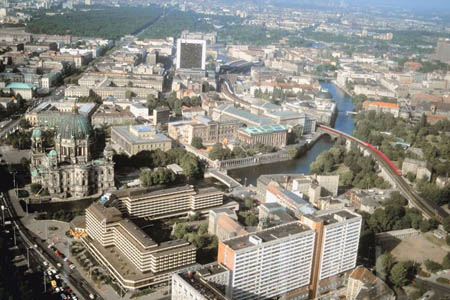
Here is an aerial view of the city of Berlin.
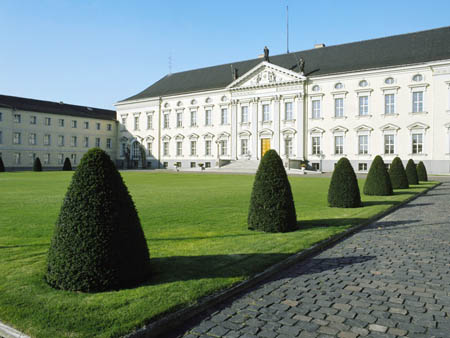
The Bellevve Schloss Palace
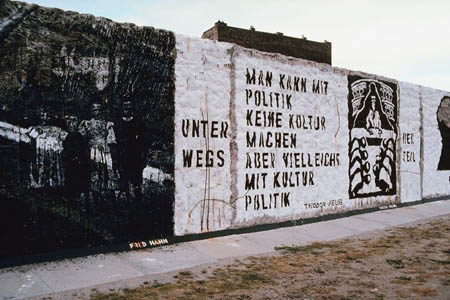
We visited a monument dedicated to the Berlin Wall. What is the Berlin Wall? Why is it famous?
The Berlin Wall In Virtual Reality - BBC Click
Airpano
Take a virtual tour of a famous castle in Germany.
There are over 80 million people who call Germany their home. Germany is surrounded by nine countries - Denmark, the Netherlands, Belgium, Luxemburg, France, Switzerland, Austria, the Czech Republic, and Poland. Germany is about the same size as the state of Montana (about 357,000 square kilometers). The climate of Germany is both temperate and marine. Both winter and summer are cool, cloudy, and wet. There are occasional days with warm mountain wind (referred to as foehn). Foehn winds are dry and hot. Over 33% of the land in Germany is arable. Germany grows many agricultural products such as wheat, barley, fruit, cabbages, potatoes, sugar beets, and others.
Fraulein Garrett explained that Germany has a wealth of natural resources. Of course, they have their arable land - but they also have coal, iron ore, lignite, natural gas, nickel, copper, construction materials, salt, potash, uranium, and others. In fact, Germany is among the world's most technologically advanced (and largest) producers of steel, coal, cement, chemicals, iron, machinery, vehicles, electronics, machine tools, foods and beverages, textiles, and shipbuilding. Some items exported the most from Germany include textiles, machinery, vehicles, chemicals, and metals. I wonder what car companies are based out of Germany? I have heard that BMW and Porsche are both made in Germany. Do you know of any others? The largest percentage of the exported goods from Germany goes to France (about 10%), followed closely by the United States and the United Kingdom.
Did you know that over 90% of those living in Germany are from German ancestors? That means they grew up in Germany; they didn't move to Germany from another country. About 34% of German residents are of the Protestant religion, and 34% of German residents are of the Roman Catholic religion. The remaining 30ish% are a mix of various religions or don't practice any religion.
We also asked Fraulein Garrett to teach us some German phrases. We learned to say Hello, I am your friend, and Help. You may not have realized this, but Dewey is part German Shepherd. He is trained to know that someone speaks the truth - If they speak in German. I sure hope Phoebe doesn't figure out that he understands German!
Text from Pandora - RU2OK? Where R U?
Text to Pandora - We R GR8. At Fraulein Garrett's house
Text from Pandora - Huh?
Text to Pandora - Hehehe, will call U L8r
We thanked Fraulein Garrett for teaching us some phrases in German (and for providing us with a delicious meal). Then we returned to our hotel for the night. The following day, we took a train to Geneva, Switzerland. Uncle GT met us here earlier today. Tomorrow there is a Global Warming conference taking place in Geneva. We are all going (Meri, Uncle GT, and me). Uncle GT believes that Phoebe and Dewey might also be attending the conference. But either way, we know they are in this city! We will update our blog ASAP. So what should we do next on our mission to find Dewey the truth-sniffing dog?
- Geo
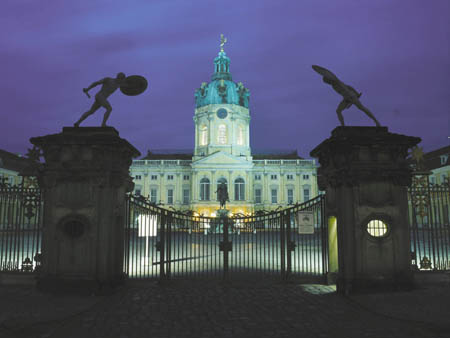
The Schloss Charlottenburg - the largest palace in Germany.
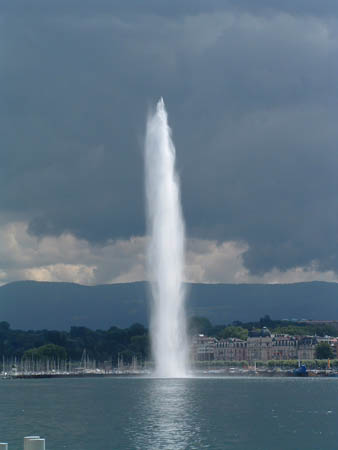
Lake Geneva - Photo used by permission. (c) 2004 D. W. Shively. All rights reserved.
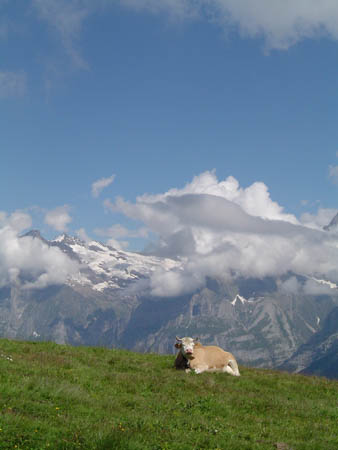
Check out this cool picture we found! The clouds, cows, and Alps in the background are amazing. Photo used by permission. (c) 2004 E. B. Shively. All rights reserved.
Map of Europe
Can you find the city of Berlin on this map? Can you find Switzerland? What cardinal direction did we travel going from Berlin, Germany to Switzerland.
arable - land that can be used to grow crops.
European Union - currently comprised of 28 countries. It was established in 1993. Some of the EU members include Hungary, Austria, Belgium, Poland, Finland, France, Germany, and numerous others. Additional countries have been added every year. To be a member of the EU, countries must have a stable democracy, respect for human rights, fair laws, a functioning market economy that is able to compete within the Union, and some other requirements.
exported - when a crop (or another product) is sent or transported to another country (for money).
Foehn - winds that are dry and hot coming from the mountain area.
Marine - a climate that is under the predominant influence of the sea. It is also known as a maritime climate and/or oceanic climate.
natural resources - any substance that is made by nature and used to enhance the lives of living things. Some examples of natural resources include sunlight, minerals, soil, and water.
temperate - a climate that provides warm summers and mild winters. The temperatures do not typically get extremely hot or cold.
United Kingdom - located off of the mainland of Europe. The United Kingdom includes England, Northern Ireland, Scotland, and Wales. There are 60,000,000 people that live in the United Kingdom.
Grade 3-5: Knows the basic elements of maps and globes (title, legend, cardinal, scale, grid, meridians, time zones, etc.).
Grade 3-5: Knows major physical and human features of places as they are represented on maps and globes. Knows how to read different maps: road, relief, globe, etc..
Grade 3-5: Knows the approximate location of major continents, mountain ranges, and bodies of water on Earth.
Grade 6-8: Knows the location of physical and human features on maps and globes (e.g., culture hearths such as Mesopotamia, Huang Ho, the Yucatan Peninsula, the Nile Valley; major ocean currents; wind patterns; land forms; climate regions).
Grade 6-8: Knows the relative location of, size of, and distances between places.
Grade 3-5: Understands how changing transportation and communication technology has affected relationships between locations. Ease of travel between some and difficulty getting to some others because of transportation and how people move and shop from one to the other because of the ease (trains, road systems, ferries, etc...).
Grade 3-5: Knows different methods to measure data (miles, kilometers, time, etc..).
Grade 6-8: Understands how places are connected and how these connections demonstrate interdependence and accessibility (such as - the role of the changing transportation and communication technology).
Grade 6-8: Knows the human characteristics of places (e.g., cultural characteristics such as religion, language, politics, technology, family structure, gender; population characteristics; land uses; levels of development).
Grade 6-8: Knows the physical characteristics of places (soil, vegetation, wildlife, etc..).
Grade 3-5: Knows the characteristics of a variety of regions (climate, housing, religion, language, etc..).
Grade 6-8: Knows how places and regions serve as cultural symbols (Opera House in Sydney or Tower Bridge in London).
Grade 3-5: Knows the physical components of Earth's atmosphere (weather and climate), lithosphere (land forms such as mountains), hydrosphere (oceans, lakes and rivers), and biosphere (vegetation and biomes).
Grade 3-5: Knows how and why people divide Earth's surface into political and/or economic units (e.g., states in the United States and Mexico; provinces in Canada; countries in North and South America; countries linked in cooperative relationships, such as the European Union).
Grade 6-8: Understands the symbolic importance of capital cities (such as Canberra, a planned city, as the capital of Australia).
Grade 3-5: Knows natural hazards that occur in the physical environment (floods, tornadoes, earthquakes, etc..).